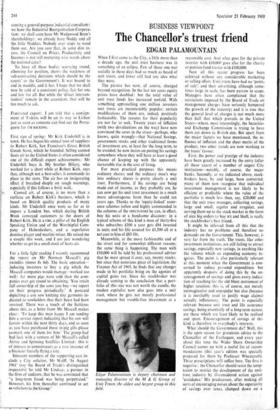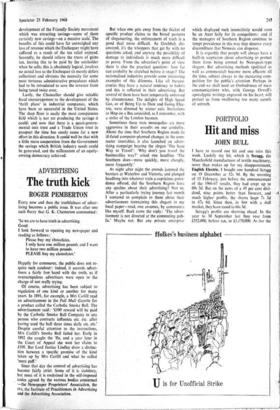The Chancellor's truest friend
BUSINESS VIEWPOINT EDGAR PALAMOUNTAIN
When I first came to the City, a little more than a decade ago, the unit trust business was in something of an eclipse. Few of those one met socially in those days had so much as heard of unit trusts, and fewer still had any idea what they were.
The picture has now, of course, changed beyond recognition. In the last ten years equity prices have doubled: but the total value of unit trust funds has increased tenfold. With something approaching one million investors unit trusts are incontestably popular; certain modifications of them are, indeed, positively fashionable. The reasons for their popularity are not far to seek. Twenty years of inflation (with -two devaluations on the way) have now convinced the saver in the street—perhaps, who knows, quite wrongly—that National Savings, government stocks and other traditional forms of investment are, at least for the long term, to be avoided; he now insists on putting his savings somewhere where they will have at least a good chance of keeping up with the apparently inexorable rise in the cost of living.
For most practical purposes this means ordinary shares; and the ordinary man's way into ordinary shares -is pretty clearly a unit trust. Furthermore, if his savings are being made out of income, as they probably are, he can now get his unit trust investment in a much more advantageous form than he could _ten years ago. Thanks to the 'equity-linked' assur- ance schemes (often and highly commended in the columns of the SPECTATOR) he can, in effect, buy his units at a handsome discount: in a typical scheme of this kind a man of thirty-five who subscribes £100 a year gets £94 invested in units and his life assured for £1,500 all at a net cost to him of £83 10s.
Meanwhile, at the more fashionable end of the street and for somewhat different reasons, the same thing is happening. The man with £10,000 will be told by his professional adviser that he must spread it over, say, twenty stocks; but since that notorious piece of legislation, the Finance Act of 1965, he finds that any changes made in his portfolio bring on the agonies of capital gains tax. Since his stockbroker was
already coming to the conclusion that a port- folio of this size was not worth the candle, the
modest capitalist now also goes into a unit trust, where he gets not merely professional management but trouble-free investment at a
Edgar Palamountain is deputy chairman and managing director of the M & G Group of Unit Trusts, the oldest and largest group in this field. reasonable cost. And what goes for the private investor with £10,000- goes also for the charity or pension fund trustee with £100,000.
Now all this recent progress has been 'achieved without any considerable marketing or selling effort. Unit trusts have had no 'points of sale'; and their advertising, although some- times large in scale, has been narrow in scope.
Managers have often complained that the . restrictions imposed by the Board of Trade on management charges have seriously hampered the growth of the industry; and it is true that the general level of charges is not much more than half that which prevails in the United States—where, most interestingly, the Securities and Exchange Commission is trying to have them cut down to British ,size. But apart from the major factors we have mentioned; the in- fluence of inflation and the sheer merits of the product, two other trends are now working in the trusts' favour.
First, the power and prestige of the industry have been greatly increased by the entry (after all those years) of a number of august City institutions—notably, of course, the major banks. Secondly, as we indicated above, stock- brokers have, by and large, been converted; many of them now recognise that individual investment management is not likely to be efficient or profitable where the value of the portfolio is much less- than, say, £20,000 and that the unit trust manager, collecting savings, large and small, regular and irregular, and serving them up to the stock market in the form of nice big orders to buy to and Shell, is really the stockbroker's best friend.
It might be inferred from all this that the industry has no problems and therefore no demands on the Government. This, however, is very far from the truth. The trusts, like other investment institutions, are still failing to attract savings, especially new savings, in anything like the volume which an expanding economy re- quires. The point is also particularly relevant at this moment when the Government is con- cerned to reduce- personal expenditure but apparently despairs of doing this by the en- couragement of savings and gives every.indica- tion of reaching for the old blunt instrument of higher taxation; this is, of course, not merely unimaginative and unpopular but also (because it is inevitably used to justify wage claims) actually inflationary. The point- is especially relevant because unit trust and life assurance savings, being essentially of a long-term nature, are those which are least likely to be realised and spent. Encouragement of savings of this kind is therefore in everybody's interests.
What should the Government do? Well, this is the open season for gratuitous advice to the Chancellor- of the Exchequer, apd every year about this time the Wider Share Ownership Council comes up with a useful list of recom- mendations (this year's. edition was specially prepared for them by Professor Wheatcroft). Three prescriptions will suffice here. The first is negative: the Chancellor should resist the temp- tation to restrict the development of the unit- trust industry by ill-considered action against `avoidance.' His predecessor, after making all sorts of encouraging noises about the superiority of savings over taxes, clamped down on a
development of the Friendly Society movement which was attracting savings—some of them certainly new savings—on a massive scale. The benefits of this could have far outweighed any loss of revenue which the Exchequer might have suffered as a result of the tax relief enjoyed. Secondly, he should relieve the trusts of gains tax, leaving this to be paid by the unitholder when he sells; this is absolutely logical, involves no actual loss to the Exchequer (it merely defers collection) and obviates the necessity for some most tortuous administrative procedures which had to be introduced to save the investor from being taxed twice over.
Lastly, the Chancellor should give suitable fiscal encouragement to the development of the `thrift plans' in industrial companies, which have been so successful in the United States. The shop .floor is easily the most conspicuous field which is not yet producing the savings it could; and now that there is a quasi-govern- mental unit trust and a Trade Union trust in prospect the time has surely come for a new effort in this direction. It could well be that with a little more cooperation from the Government the savings which British industry needs could be generated, and the millennium of an equity- owning democracy achieved.



































 Previous page
Previous page